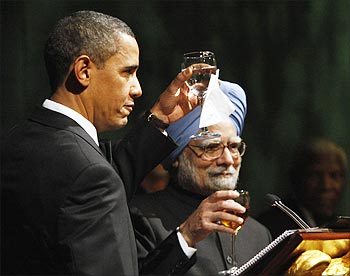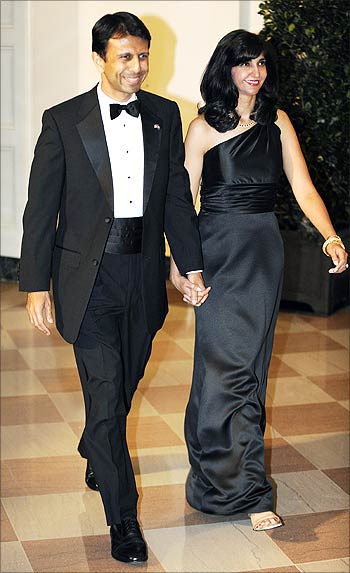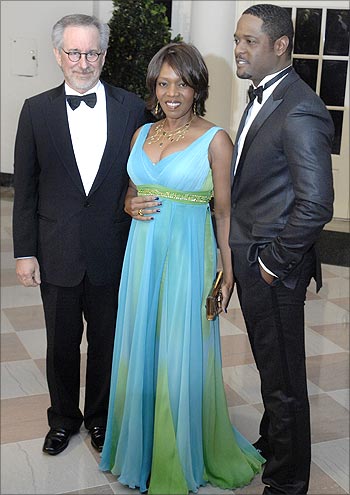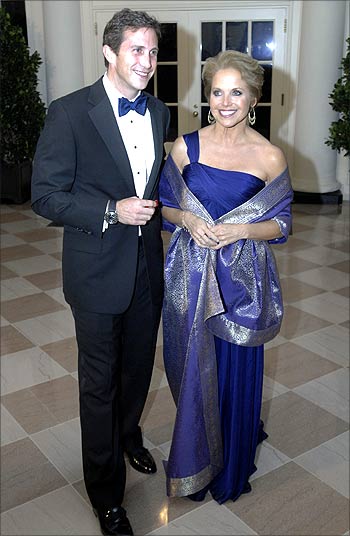
In contrast, the guest list for President Barack Obama's state dinner for Prime Minister Singh -- the first formal White House event of his presidency -- is a nuanced, carefully considered mix of politics and business, of hard power and soft.
The governmental/administration names on both sides of the table are no-brainers that requite little elaboration: the cream of the Indian delegation was present, as were the American vice president, the Secretary of State (who, in noticeable variance to her peers in the administration, did not have her spouse in attendance, likely because neither she nor her boss would want Bill Clinton sneaking the show out from under their noses) and secretaries and top officials of key departments such as climate change, energy, homeland security et cetera.
It is on the political side that Obama sprang a few surprises. Thus, while the picking of House Majority Leader Steny Hoyer or a Gary Ackerman was mandatory, given Heyer's membership in, and Ackerman's status as, co-chair of the Congressional Caucus on India and Indian Americans (Ackerman, incidentally, picked as his guest New York hotelier Sant Singh Chatwal, confidant of Bill and Hillary Clinton and one of the latter's most prominent fundraisers during her presidential campaign), other guests were indicative of some thought going into assuaging Indian concerns and reducing opposition on the Hill.

Berman was known for his hawkish opposition to the United States-India nuclear cooperation agreement, and for introducing a stream of 'killer amendments' calculated to torpedo the deal during the House debate. Crucially, however, he is more recently emerging as a hawk on Pakistan; thus, when the bill to provide a five-year, $7.5 billion aid package to Islamabad was being framed, Berman's version incorporated stringent conditions tying the assistance to visible, calculable gains in the war on terror.
Berman also incorporated an oversight mechanism to ensure that aid given to Pakistan for the war on terror was not diverted to its anti-India activities (it is a different matter that these conditions had to be abandoned under White House pressure; Berman has continued to speak out about the need for stringent oversight and, earlier this year, led a Congressional Delegation to India expressly to discuss Afghanistan and Pakistan with the likes of Prime Minister Singh and National Security Advisor MK Narayanan).
Incidentally, Senators John F Kerry and Richard Lugar, who authored the far more Islamabad-friendly aid package Obama signed, were both present.
On a related note, what is common between Senators Bob Casey of Pennsylvania and Kent Conrad of North Dakota, and Congressmen James Clyburn of South Carolina and Elijah Cummings of Maryland, to name just four Capitol Hill luminaries out of nearly a dozen? They all voted against a nuclear cooperation deal with India in the respective Senate and House debates, and continue to be fervent opponents of the US having any nuclear truck with India.
Was their inclusion counter-intuitive, or does it signal a White House sense that, as it moves to make the deal operational, these are some of the lawmakers who can be persuaded to drop their opposition and back the next steps?
Equally, the growing Indian-American presence on both sides of the aisle in American polity was carefully acknowledged by the seating of Louisiana Governor Bobby Jindal; Iowa Senator Swati Dandekar and Iowa Representative Jay Goyal; Kansas Rep Raj Goyle; San Francisco District Attorney and candidate for state Attorney General Kamla Harris, and Minnesota Senator Satveer Chaudhry were present and accounted for.
Worth noting in this connection is the presence of Ambassador Vinai Thummalapally, one of Obama's closest Indian American pals and a prominent fundraiser, who was earlier this year rewarded with the soft posting of envoy to the US embassy in Belize. On the public affairs side, again, the community's varied activities were represented by a lineup that ranged from Asia Society president Vishaka Desai to Taxi Workers Alliance, New York founder-chief Bhairavi Desai.
India's growing interest in Hollywood got a nod with the inclusion of film-maker M Night Shyamalan and Hollywood moguls Jeffrey Katzenberg and David Geffen, and legendary director-producer Stephen Spielberg. Opinion makers -- who will likely front the effort to proselytise 'US-India 3.0' in Secretary of State Hillary Clinton's formulation, included the likes of CBS anchor Katie Couric, NYT columnist Tom Friedman, CNN's Dr Sanjay Gupta, Washington Post Managing Editor Raju Narisetti and the paper's National Editor Rajiv Chandrasekharan, NBC's Brian Williams and CNN's influential foreign policy voice and anchor of eponymous show Fareed Zakaria.
A sidelight: high up in the guest list is a certain Apratim 'Tim' Dutta, who is specifically named as spouse of Ms Pia Awal. Stem cell research is a major line item in the Democratic agenda, and Awal's battle with acute myelogenous leukemia had in the mid 2000s become first a community, and then a national, cause celebre.